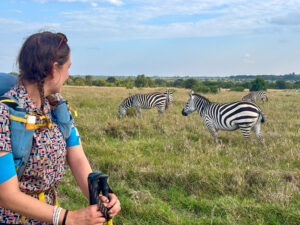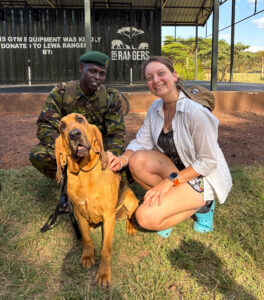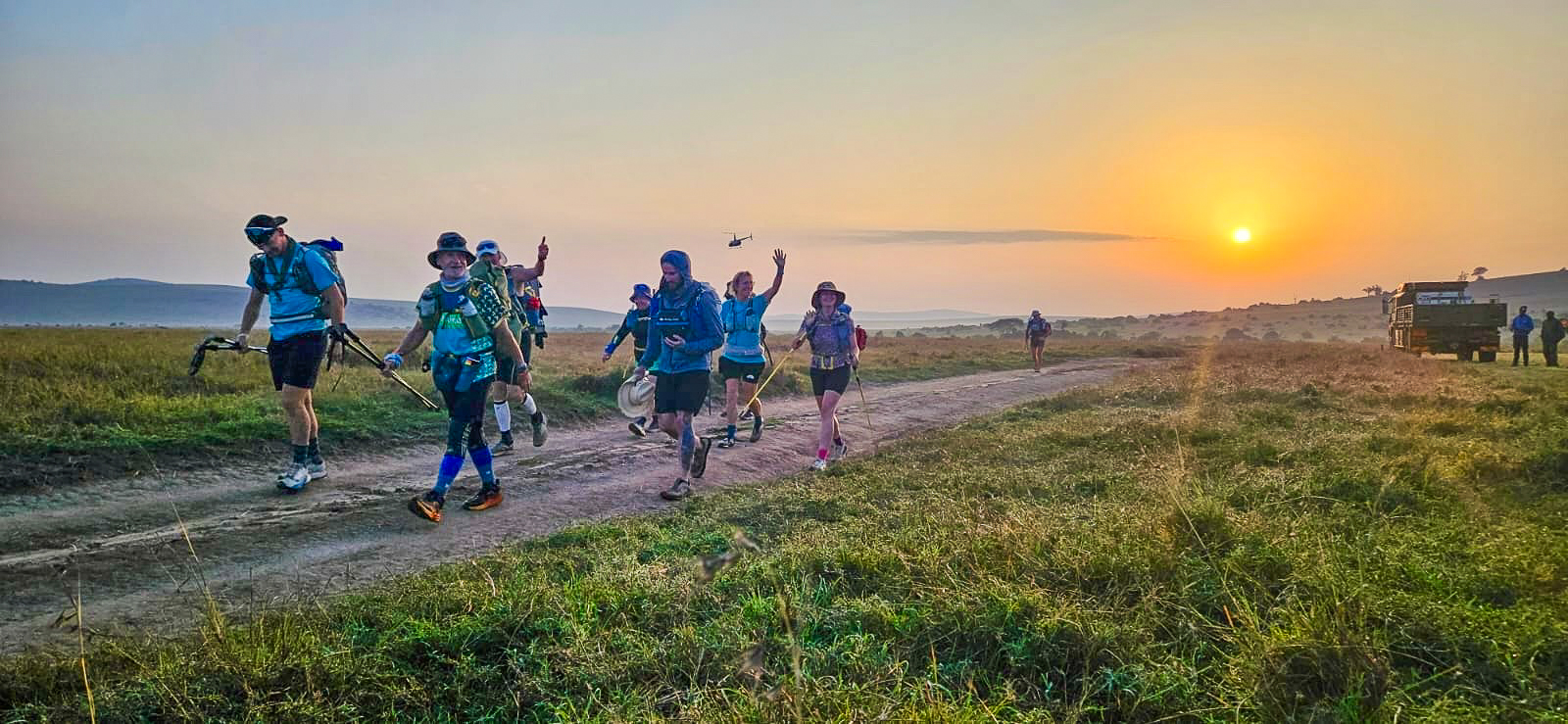Running with a Chronic Illness Ep. 3: Why You Need to Do Big Things
Hello, my name is Pav, and at the start of this month, I ran a 230-km self-sufficient race across Kenya. Let’s talk about why big and crazy goals are the bees’ knees when it comes to living your life fully despite chronic conditions.
Written & edited by Pavlína Marek
(Disclaimer: I’m not a health care professional. The following information is compiled from peer-reviewed research and personal experience. Always listen to your body and check with your healthcare provider before starting a new exercise regimen.)
In the past, I’ve written about the physiological side of running with a chronic illness. Then we discussed the psychological implications, including motivation strategies, expectations, and the double-edged sword that can be resilience.
After finishing For Rangers Ultra, I feel much more qualified to talk about today’s topic of setting ridiculous goals in the face of adversity.
View this post on Instagram
There can be a huge personal victory in finishing a race dead last. Of being the finisher with the longest finishing time ever. (Yes, I scoured the website and all past results. Yes, my finishing time of 52 hours and 7 minutes is the longest.) This is true especially when the finish comes despite, not thanks to, the circumstances of your life.
When you live with a chronic illness, it never quite goes away. Your body becomes unpredictable, energy levels fluctuate without warning, and simple tasks can suddenly feel monumental. The world around you keeps moving at its usual pace while you’re forced to slow down and learn to live in a different reality.
While everything might feel like it’s crumbling down, setting audacious goals can become one of your most powerful tools for reclaiming control. When your condition tries to dictate your limits, setting a ridiculous, over-the-top goal and putting on those running shoes day in, day out, becomes an act of defiance. When chronic illness threatens to shrink your world, big goals expand it again. They give you something to fight for beyond just managing symptoms.
The eventual victory doesn’t come from pretending everything is fine. It comes from acknowledging your reality and choosing to dream big anyway.
What Your Body Goes Through
We’ve covered the physiological impact of exercise on chronic illness (and vice versa) before. Here’s a (very) quick refresher.
Living with conditions like heart disease, multiple sclerosis, or fibromyalgia creates a complex relationship with movement. Your body becomes unpredictable. Some days you wake up feeling capable of conquering the world, while others leave you questioning if you can make it to the bathroom. Pain often becomes your most faithful companion.
When it comes to running specifically, these challenges intensify. Your pace might vary dramatically from day to day. That 5K route you conquered last week might feel impossible today. You constantly have to switch between pushing through discomfort and recognizing genuine warning signs.
The frustration runs deep. You remember what your body used to do, and grief for that former self is real and valid. Yet acknowledging your new limitations doesn’t mean surrendering to them. Recognition becomes the first step toward adaptation. You’ll need to understand that your running journey will look different, not lesser, from that of others around you.
Why Big Goals Matter So Much
There’s an undeniable need for honesty here: sometimes, things suck. Sometimes, things suck so much that the only thing you want to (and can) do is lie down in your bed and cry it out. And there’s nothing wrong with doing just that. When that happens, you’ll need something to pick you up again. You’ll need something you’re passionate about, something that’ll make you want to fight to get out of that slump. Enter your BIG, CRAZY, RIDICULOUS GOAL. (Should we add a trademark?)
The reason I signed up for For Rangers Ultra wasn’t originally to have a big goal. I had dreamt about that race for four years, saving up and watching their YouTube films on repeat. I’d dreamt about supporting the two charities they work with: For Rangers and Save the Rhino. I’d dreamt about meeting my fellow runners despite not knowing what people our cohort was going to be composed of.
I knew that when it all was finally over, in the words of writer and ultrarunner Brendan Leonard (who’s unwittingly the reason I run), “I needed something big and scary enough to get me off the couch.” I also refused to put off that race any longer, as the question came to mind: how much longer will I be able to run?

Find Purpose and Hope Beyond Your Condition
Your mind craves purpose, especially when medical appointments and symptom management threaten to consume your identity. When things didn’t improve as much as I wished they did, when I had to go back for more medications, when I wanted to lose hope, my big and crazy goal of running this race was like an anchor.
Your big and crazy goal will remind you that you’re still the person who dreams, who strives, who refuses to be defined by your condition. Whether it’s completing a marathon, running a 10K, or simply jogging continuously for 30 minutes, these targets help your mind get over the daily limitations.
The beauty of big goals lies in their ability to generate hope during your darkest moments. When fatigue overwhelms you or symptoms flare unexpectedly, that distant finish line becomes a beacon. It reminds you that today’s struggle isn’t permanent, that your body is capable of remarkable things despite the extra challenges.
How to Set and Achieve Big Goals While Managing Chronic Illness
1. Start with your healthcare team as your foundation (not to ask for permission; to ask for cooperation)
Your doctor, specialist, or physical therapist knows your condition better than any running forum or well-meaning friend. Schedule a conversation specifically about your running ambitions. Bring a written list of your goals, whether it’s completing a 5K, running a half-marathon, or simply maintaining consistent weekly mileage. This consultation isn’t about getting permission; it’s about creating a safety net that allows you to push your boundaries while being smart about your health.
Time for honesty: do as I say, not as I do. Besides endometriosis, I also have a II-degree AV heart block. When I asked my cardiologist if I could keep running, he probably didn’t expect me to go for an ultramarathon of this scale. He did, however, say that running is good for my heart. When regular checkups didn’t show any worsening due to training (which was, frankly, quite sporadic due to my other condition), I took that as a good sign. The medics at the event also knew about my condition, and we had a chat about expectations and safety.
2. Transform overwhelming dreams into manageable tasks.
That marathon goal? Break it down. Ruthlessly. Start by running for 10 minutes without stopping. Then 20. Then do a 5K. Each milestone becomes its own celebration, its own victory. Always look to the horizon at your big goal as if it were a lighthouse guiding you on your way, but celebrate every mile that gets you closer to it.

I had a running background of seven years, five of which were fairly consistent with at least one or two races every year. Therefore, I knew what my body and mind could and couldn’t do. I knew that even without good training blocks, I was probably going to get through it somehow. (In all those training months, I had one single training week that went as planned. Only one.)
My one advantage is my mind. Despite having dealt with clinical depression, I’m pig-headed (or, as my fellow runners like to say, determined). I knew I was going to be able to push my body even when it really wasn’t up to the task anymore. If you’re just starting out, take time to learn about how your body and mind respond to exercise and distance. You’ll need a bit of extra resilience compared to your healthy running friends.
3. Create your own definition of success.
Your running journey will look vastly different from that of a person without chronic illness. I don’t like saying “That’s not a limitation, it’s your unique strength.” I always found those statements to be a little toxic. (How is debilitating pain a strength?)
However, when you complete a training run despite everything, you’ve accomplished something extraordinary, and you do gain a bit more strength through it. I suppose that’s how I’d fix those statements. “There is a limitation, but it’s an opportunity to become stronger.” When you show up to the starting line of a race, you’ve already won something most people will never understand.
Track your progress in ways that matter to your situation, not in ways that matter to others.
Conclusion
Your chronic illness doesn’t define the limits of what you can achieve. It will, however, shape the path you’ll take to get there. Empowerment through big goals isn’t about comparing your results to someone else’s or pretending your condition doesn’t exist. It’s about recognizing that your journey has unique value and incredible potential.
Your dreams aren’t “lesser” (just finishing a race, no matter how long it takes, versus winning the race)—they’re as much (and, to you, more) meaningful. When you set a big goal while managing a chronic condition, you’re not just training your body; you’re training your spirit to believe in possibilities beyond your current circumstances.
Transform how you see yourself: not as someone limited by disease, but as someone capable of extraordinary things.



